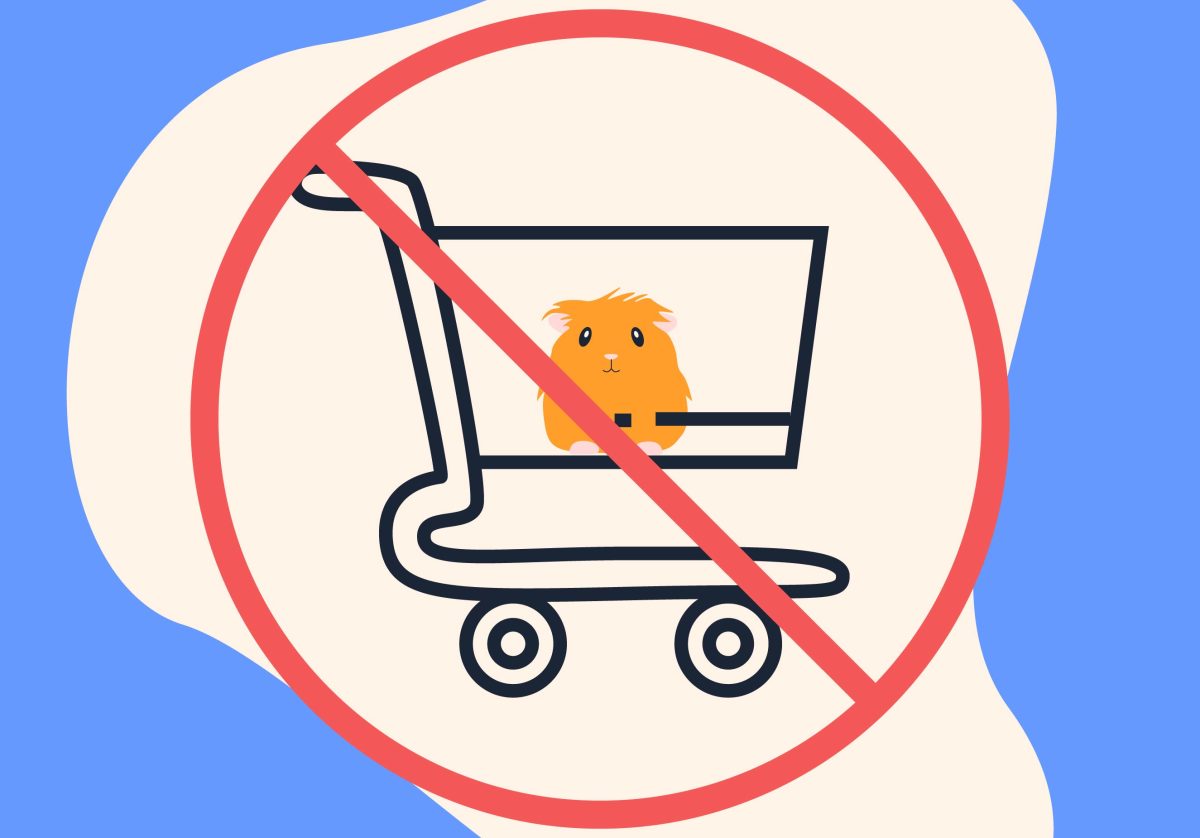When I was younger, there was nothing quite like going to my local PetSmart and immediately running towards the section of the store where all of the adoptable cats were. As I made my way over to them, I walked past the seemingly endless amount of aquarium pets, guinea pigs and geckos for sale.
It almost felt like I was at a Build-A-Bear Workshop, where I could pick out the cutest furry friend, name it and buy thousands of unnecessary accessories for it.
In fact, I did exactly that in 2016. I bought a baby guinea pig from a PetSmart near my house and named him Stewart. I bought him everything under the sun that I could find in that store including a harness with a leash, a t-shirt and toys.
I’ve since discovered the leash and some of the toys were incredibly dangerous for guinea pigs.
In PetSmart’s defense, Stewart did end up being one of the best pets in the world. However, PetSmart and Petco may not be the best place to adopt a pet from.
Alicia Sanders, founder of Piggy Haven, a local guinea pig rescue, said pet stores don’t often provide thorough instructions on how to properly care for the animal one chooses to adopt. This may set people up for unrealistic expectations about what life may look like when caring for a pet.
“A lot of [guinea pigs from pet stores] come with health concerns like ringworm, mites or lice,” Sanders said. “My first guinea pig I ever got was from a pet store which died within 10 days.”
These traumatic situations are more common than one might expect.
Common pet-store industry problems include selling sick or injured animals to customers, caring for animals in unsanitary conditions, inhumane disposal of sick or dying animals and improper veterinary care, according to People for the Ethical Treatment of Animals (PETA).
It goes beyond the rodent and small-pet section of these stores. PETA said a significant portion of dogs come to pet stores from puppy mills, which are mostly midwestern breeding kennels known for their inhumane practices.
Will Sammons, a third-year student at the University of Minnesota, is a supporter of adopting pets from animal shelters and rescues. He adopted his cat, Albert, from a shelter near his hometown in Illinois.
Sammons said that the adoption process at the shelter where he bought his cat was so simple and easy that he recommends that more people adopt from shelters and rescues.
Additionally, he said that the overall adoption fees were very cheap compared to the typical purchase prices from stores and breeders. He got his furry friend for the low cost of $25.
This is beneficial for college students as most of us who feel ready to become pet owners don’t necessarily have the funds to go through with an adoption.
It is important to consider the pros and cons of owning a pet before beginning the adoption process.
Sammons said that owning a pet in college is not for everyone as it can be very time-consuming and, depending on the pet, very expensive.
“I feel like my mental capacity is there to take care of something else besides myself,” Sammons said. “It is definitely an added responsibility.”
He said adopting a cat was perfect for him and his lifestyle since as cats are relatively low-maintenance in comparison to other animals, like dogs.
Sammons recommends considering any potential lifestyle changes that may happen in the first few years following your decision to adopt a pet.
As someone who now has experience with adopting two guinea pigs from Piggy Haven, I would recommend the same. College students need to consider the temporariness of their living situations for the next four or more years.
Sanders said college students are not necessarily unfit for owning a pet, but their living situations may be an added obstacle in the future as they move to different apartments and houses. It is important to consider what your current and future leases may say about having pets in the building.
Animals bring so much joy and beauty to the world. Their unconditional love will leave a forever mark on you and your family. However, it is important to remember that these animals are very vulnerable and depend on you to live a happy and healthy life.
If you visit your local pet store and see any signs of inhumane treatment towards the animals, PETA recommends reporting it to an animal control agency or police department.
Don’t be afraid to be an advocate for the animals you see for sale in pet stores. If they are indeed living in harmful conditions, speak to the employees about your concerns.
Obviously, one conversation won’t stop pet stores from selling animals, but it lets employees know that customers are not oblivious to the type of treatment the animals are receiving.
If you choose to adopt a pet, be sure to provide them with the same unconditional love and remember to be responsible when situations with your pet feel overwhelming.














